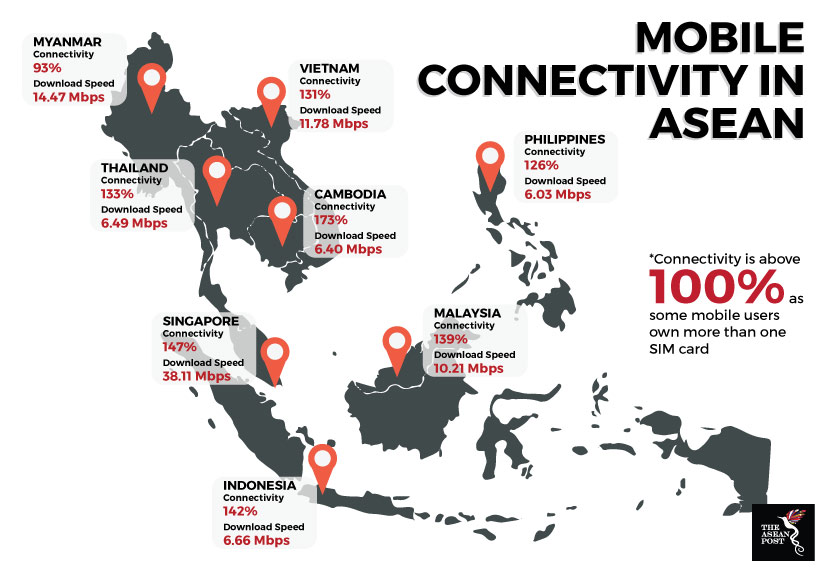Industry 4.0, also known as the Fourth Industrial Revolution, is not only inevitable but is already upon us. While internet connectivity plays a major role in the realisation of Industry 4.0, there is little reason to doubt the significance of mobile internet connectivity as well. This, however, may set alarm bells ringing for some ASEAN countries which are far behind when it comes to the ever-evolving nature of mobile connectivity.
A recent study on online video quality does not paint a pretty picture for Southeast Asia nations with the exception of Singapore. The study, conducted by Opensignal - a London-based company that specialises in mapping wireless coverage – involved 69 countries including eight ASEAN member states with the exception of Brunei and Lao PDR.
Unsurprisingly, Singapore achieved the highest score in overall video experience in the region by scoring 66.9 out of 100, placing it fifth on the overall ranking compared to the Czech Republic which placed first with a score of 68.5. It was also the same case for download speeds where Singapore dialled in at 38.1 megabits per second (Mbps), placing the city-state in third place compared to South Korea which dialled in at 45.6 Mbps in first place.
Importance of reliable connectivity
The study, which was conducted from June to September, attributed the poor video-watching experience in some Southeast Asian countries to slow internet download speeds. Opensignal said that it was “no surprise” that Cambodia, Malaysia, Indonesia, the Philippines, Thailand and Vietnam had poor video-watching experiences due to the fact that these six countries have less than 10 Mbps on average download speeds.
But while speed played an important part in the quality of video-watching in these countries, Opensignal also noted that speed was not everything and that it was, in fact, latency which played a bigger role. This, however, only applied to countries where download speeds were already high.
In September, World Bank economist Richard Record hinted at the importance of connection speeds when speaking about e-commerce in Malaysia.
“Without ultrafast broadband, innovations such as artificial intelligence, the Internet-of-Things, and Industry 4.0 will not be feasible,” he said.
SAGE Automation, an Australian provider of industrial automation and control services, also seemed to concur with this when it noted the importance of 5G networks for Industry 4.0.
“Industry 4.0 technologies begin and end with data that is captured and stored on dependable communication networks,” it said.
 Source: Various sources
Source: Various sources
A large mobile market, but…
ASEAN has a large mobile market with all member countries averaging more than 100 percent active mobile internet connections as opposed to population. The number of active connections far outweigh the populations in these countries as most mobile users in the region own more than one SIM.
In fact, according to We Are Social, as of January 2017, the region’s average went beyond the global average in terms of mobile internet connectivity. While the global average was 108 percent, the regional average was 133 percent.
A Google and Temasek report also predicted that the region is poised to reach 480 million internet users by 2020, and that smartphones will make up the lion’s share of Southeast Asia’s internet population as currently, roughly 90 percent of Southeast Asia’s internet users are on smartphones.
But more than this, the report also found that on average, consumers in Southeast Asia spend 3.6 hours per day on mobile internet. Thailand leads with 4.2 hours per day, followed by Indonesia at 3.9 hours per day. For context, consumers in the US spend an average of just two hours per day on mobile internet.
The studies are clear and unfortunately show that while ASEAN states have high internet speeds and penetration rates, mobile internet connectivity quality in these countries is poor compared to some other parts of the world. It would be a shame if ASEAN’s poor mobile internet connectivity quality hurts its ability to leverage off its high internet speeds and penetration rates. If ASEAN hopes to be Industry 4.0-ready then it will have to take this into consideration as experts have already highlighted the importance of fast and reliable mobile internet connectivity.
Related articles:
High smartphone usage to boost ASEAN mobile commerce
Embracing the Fourth Industrial Revolution
